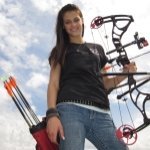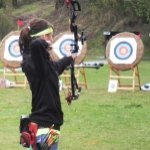How Do I Select The Correct Compound Bow Size?
by Willy Evers
(Cali, Colombia)
Good evening!
I had to quit International Skeet Shooting due to hearing problems after shooting for 40+ years.
Doctors recommended to change for a quieter sport and suggested chess. As I will NOT pay attention, I decided to switch to bow and arrow, especially after the experience I just had in the World Games in Cali, Colombia, my home city.
I have been reading your site, but didn't find how to select a compound bow.
My draw length is 28.5", which gives me a 66" to 68" bow (I assume a recurve bow).
I also assume that the decision between using a compound bow and recurve bow depends in the comfortability with each one. Am I correct?
Regards,
Willy Evers
Comments for How Do I Select The Correct Compound Bow Size?
|
||
|
||
![]()
Copyright © 2017 Learn-Archery.com All rights reserved
Learn-Archey.com is my personal site. It accepts advertising and other forms of compensation.
Such compensation
does not influence the information on this site. I always give my honest opinions, findings, beliefs, or experiences.












